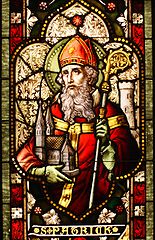
The Life And Writings Of Saint Patrick -Saint Patrick
I.—LIST OF THE OFFICIALS
ONE of the most interesting chapters of the Tripartite Life gives us a brief account of the household or family of St. Patrick. The list comprised twenty-four persons, who are described as ‘in Orders,’ though we need not assume that they were all in Holy Orders. The same list, with very slight variations, is given in the Book of Leinster and in the Lebar Brecc, so that it must be regarded as a very ancient and authentic catalogue. It is particularly valuable on account of the light which it throws on the social life of the period, and the many difficulties of St. Patrick’s missionary career in Ireland.
In order to understand the document we must bear in mind that Ireland at the time was, as St. Patrick himself says, a ‘barbarous’ country, that is, one entirely beyond the pale of Roman civilisation. It contained no towns, no roads, no bridges, no hotels, in the modern sense of the words. The people lived a simple, primitive life, subsisting for the most part on the produce of their flocks and herds, with some tillage, and also the spoils of the chase and the fishings of their rivers. It is certain, indeed, that there was some, but not much, foreign commerce, for as the ports of Erin were known to merchants in the days of Tacitus, they must have become still better known in the reign of Niall the Great and his successors.
But they had, of course, before Patrick’s time, no Christian churches, no appliances of public worship, no sacred books. Whatever Patrick and his companions did not bring with them for the equipment of their churches, they must of necessity produce themselves, as best they could from their own resources.
Then, again, in their missionary journeys through the country, though Patrick and his companions would, no doubt, sometimes accept the hospitality of their new converts, it was not always tendered to them, and it would not, even if tendered, have been always safe to accept it. The Apostle tells us himself that his life was often in danger, and we know that at least one attempt to poison him was made by the Druids at the table of the High-King. It was, therefore, necessary for the Saint and his companions to carry tents and waggons with them for their accommodation. When a longer stay than usual was made in a desirable place they built for themselves sheds of wood or wattles, as at Drumlease, in Leitrim, which took its name from those sheds.
No doubt, too, they found it, generally speaking, both safe and desirable, from many reasons, to cook their own food. These considerations will serve to explain the list of clerical officials belonging to St. Patrick’s household.
The following is the catalogue, as given in the Tripartite:—
Sechnall, his bishop (epscop).
Mochta, his priest (saccart).
Bishop Erc, his judge (breithem).
Bishop Mac Cairthinn, his champion (trenfer).
Benen, his psalmist (salmchetlaig).
Coeman of Cell Riada, his chamberlain (maccoem).
Sinell of Cell Dareis, his bell-ringer (astire).
Athcen of Both Domnaig, his cook (coicc).
Presbyter Mescan of Domnach Mescain at Fochain, his brewer (scoaire).
Presbyter Bescna of Domnach Dala, his chaplain, or rather his sacristan (sacart meisi).
Presbyter Catan and Presbyter Acan, his two attendants at table (da foss).
Odran of Disert Odrain in Hui Failgi, his charioteer (ara).
Presbyter Manach, his fire-woodman (fer connadaig).
Rottan, his cowherd (buachaill).
His three smiths, namely, Macc Cecht; (Laeban) of Domnach Laebain; it is he that made the (bell called) Findfaidech, and Fortchern in Rath Adine—or, as it is elsewhere, Rath Semni.
His three wrights (cerda), Essa, and Bite, and Tassach.
His three embroideresses (druinecha), Lupait and Erc, daughter of Daire, and Cruimtheris in Cengoba.
He had also three masons, not given here, namely, Caeman, Cruineach, and Luireach the Strong.
The provincial kings, we are told, all had similar households; and it was not fitting that the High Bishop of all Erin should have less. As a fact, they were all necessary officials.

 Keep Site Running
Keep Site Running